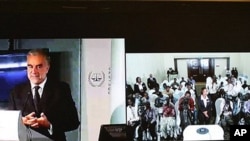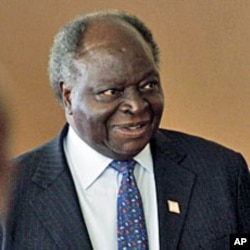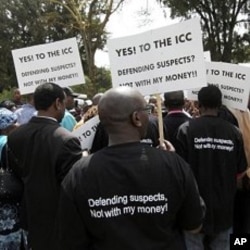As United Nations Security Council members consider Kenya’s request for a deferral of its ICC trial, Kenya’s leaders are engaged in a war of words over the will and interests of the country's people.
International Criminal Court’s inquiry
In the coming weeks, the U.N. Security Council will consider a request, backed by the African Union, to defer the International Criminal Court’s inquiry into the Kenyan post-election violence of 2007 and 2008.
The court recently summoned six prominent Kenyans to answer for their roles in the ethnic violence that left over 1,300 dead and 300,000 displaced following a disputed presidential election between President Mwai Kibaki and his challenger, current Prime Minister Raila Odinga.
While initially supported by Kenya’s leaders, the government recently petitioned the Security Council for a one-year deferral of the proceedings, in order for the country to enact judicial reforms and try the suspects locally.
ICC prosecutor's assurance
While many International observers have blasted Kenya's diplomatic efforts to stall the trials, ICC Prosecutor Luis Moreno Ocampo on Monday assured journalists that the country’s efforts were simply part of the court process.
“I have my responsibility. I will do my cases," he said. "Political leaders can decide to use Security Council decisions. The Security Council will have their own responsibilities. This is part of the institutional system to manage the discussion; and it is a vital discussion. Kenyans have to lead this discussion.”
Under the Rome Statute - which governs the ICC - the Security Council may grant deferrals if a case presents a significant threat to international peace or security.
Consulting on deferral
The Kenyan government is hoping that clause will give it another shot at dealing with the post-election violence.
But recently, opposition leaders and civil society groups have emerged to question whether deferral is truly the will of the Kenyan people.
It emerged Sunday that Odinga’s Orange Democratic Movement, Kenya’s largest opposition party, requested that the Security Council reject the country’s request for deferral. In a letter written by Party Secretary-General Anyang’ Nyong’o, ODM claimed the deferral campaign had been organized by President Kibaki’s Party of National Unity in an effort to sustain impunity in Kenya.
The letter also claimed that ODM - a partner with PNU in Kenya’s coalition government - had not been appropriately consulted in the deferral decision.
The letter was immediately denounced by PNU as well as members of ODM’s so-called rebel wing. The group of dissenting ODM politicians includes former Higher Education Minister William Ruto, one of the six suspected by the court of orchestrating the election chaos.
Members of ODM allied with Ruto wrote a separate letter to the Security Council asserting the letter written by Nyong’o did not represent the ODM position as it had not been put to a vote. The group further called the initial ODM letter “fraudulent” and “ill-advised.”
What do people want?
Meanwhile, there is another battle being waged amidst the grassroots, with each side of Kenya’s deferral debate claiming the support of Kenya’s citizens.
A coalition of civil society groups recently launched a petition in support of the pro-ICC groups. The new chairman of the National Council of Non-Governmental Organizations, Ken Wafula, claimed the coalition has collected over 1.4 million signatures.“There is a wrong perception that has been created, that the Kenyan people are calling for a deferral of the ICC cases," said Wafula. "What we want to drive across is that is not true. The majority of the people want the trials at the ICC to continue. They do not want deferral.”
Wafula told VOA a large portion of those signatures have come from Kenya’s Rift Valley - a hotspot of violence during the post-election crisis. The organizers believe they can collect over 2 million signatures and have already presented 1.4 million to the Security Council.
But on Wednesday, PNU Member of Parliament Kambi Kazungu told members of the press that most Kenyans supported deferral.
10 million signatures for government
Kazungu claimed to have collected over 10 million signatures in support of government efforts at the United Nations and urged Kenyans not to allow their nation to be run by foreign powers.
With the two sides making opposing claims, Law Society of Kenya head Apollo Mboya says the back-and-forth will be damaging to Kenya’s case at the Security Council.
“It is not good for the government," said Mboya. "It will show that there is no consensus on the issue of the deferrals and when there is no consensus the best thing to do is to leave it for the ICC to proceed.”
It is not yet known when the Security Council will address Kenya’s request, but the case does not look hopeful. While Britain's representative has promised to hear all parties, both the United States and France have already expressed their lack of support for deferral.






